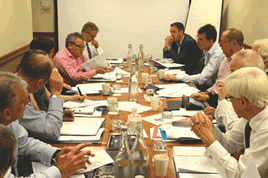We met in one of those anonymous, windowless, below-ground hotel conference rooms in central London, a short walk from Charing Cross.
All of our expert panel are men, mostly towards the upper end of the spectrum one should describe as middle-aged. Mostly grey-haired and wearing grey suits, some with ties and some without. People you would barely notice on a train.
But these are some of the sharpest minds from the top echelon of decision-makers in the rail industry. Their challenge: to come up with the makings of a manifesto representing what the industry feels Secretary of State for Transport Patrick McLoughlin and Network Rail Chairman Sir Peter Hendy should prioritise.
The panel comes from widely different backgrounds and areas of expertise: passenger and freight operations, safety, regulation, consultancy and lobbying. The writers of all the open letters featured in this issue are all present, as well as members of the regular RailReview Editorial Board. But despite the varying backgrounds of the group, there was more than general consensus of what lies at the heart of the industry’s troubles. There was widespread agreement, and dissent only in the fine detail.
It can be summed up simply: an absence of long-term strategic thinking at the heart of the Department for Transport, and a lack of authority among the masters of the railway. There is no shortage of gifted leaders, but in a fragmented structure they are not in the most influential jobs.
One after another, the members of our panel concluded that there is an absence of authority at the top of the rail industry, and in particular at Network Rail. In an industry driven by complex processes and procedures put in place 20 years ago, too often the needs of the customer are secondary. Success is driven by a requirement to tick boxes rather than providing what the traveller wants.
Critically, rail’s leaders are failing to ensure that they dovetail into the wider context of the British transport system as a whole.
Panel members were keen to stress that the structure of the railway is far from broken - a doubling of passenger numbers, an enviable safety record and a rapidly increasing revenue stream are evidence of considerable success. But even greater success is being hindered by fundamental flaws…
“In our manifesto it is important to think about tone,” stressed Transport Focus Chief Executive Anthony Smith, who chaired the debate.
“If we write to Sir Peter Hendy and say ‘it’s all bust’, we are not going to make much progress. This provides an opportunity to accelerate change that is already happening, but not fast enough. If we get a sustainable long-term strategy with appropriate funding, everything else the industry needs to achieve can flow from that - the collaborative supply chain, the skilled staff to operate it, and ultimately the rekindled trust that passengers will have in the system. The tone is crucial.”
One of the key themes across the discussion was the subject of:
Accountability and Authority
The core of the debate was about who has the authority to lead the railway, and who takes ultimate responsibility for its direction. There are plenty of leaders, it was felt, but there is an alarming gap right at the top - a guiding authority with the ability to pull all the disparate groups on the railway in a single direction.
“The elephant in the room is that the Government now owns Network Rail,” argued Anthony Smith. “And the degree to which Network Rail is responsible for its own destiny is somewhat cloudy. The Government keeps asking it to do things, pronouncing changes during an election campaign.
“This reveals a lot about the state of the whole system. We have to reflect on what that means for the speed at which Network Rail can bring about changes.”












